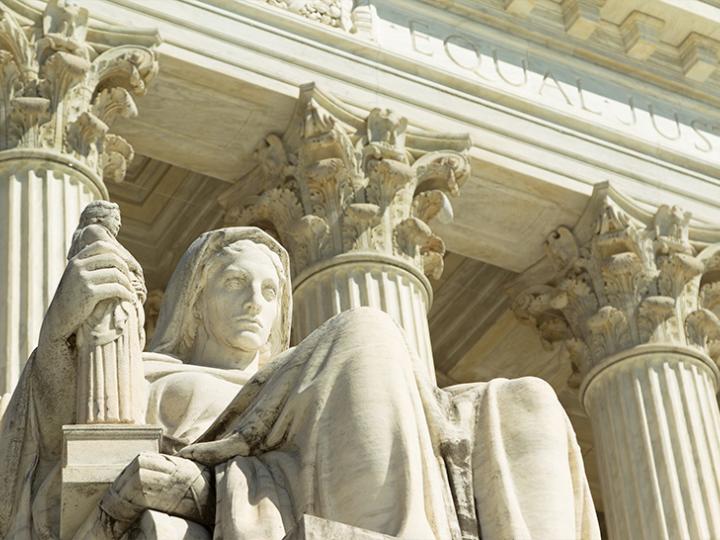In Diaz v. United States, No. 23–14 (June 20, 2024), the U.S. Supreme Court, in a dissenting opinion, cited Model Penal Code § 2.02 in arguing that Federal Rule of Evidence 704(b), which prohibited an expert witness from stating an opinion about whether a defendant had a mental state or condition constituting an element of a crime charged or a defense, did not permit an expert to offer a probabilistic assessment that “most” persons like the defendant had a culpable mental state.
In this case, the defendant argued that she lacked the mental state required to convict her of drug-trafficking charges because she was unaware that drugs were concealed in the car she was operating when she drove it across the Unites States–Mexico border. When the defendant arrived at a port of entry to the United States, a border patrol officer left his inspection booth to assist the defendant with rolling down the car’s manual rear driver-side window. While attempting to roll down the window, the officer “felt some resistance” and then heard “a crunch-like sound in the door” which led him to investigate further, given his experience that car doors were a common hiding spot for contraband. The investigation uncovered 56 packets of methamphetamine tucked inside the car’s door panels and underneath the carpet in the trunk. The defendant was arrested and, after waiving her Miranda rights, agreed to an interview in which she asserted a “blind mule” defense, arguing that she did not know that there were drugs in the car.
The defendant was charged with importing methamphetamine in violation of 21 U.S.C. §§ 952 and 960, which required that the government prove that the defendant “knowingly” transported the drugs. Before trial, the government gave notice that it would call a U.S. Homeland Security Investigations Special Agent as an expert witness to explain that drug traffickers “generally d[id] not entrust large quantities of drugs to people who [we]re unaware they [we]re transporting them.”
The defendant objected to the proffered testimony of the government’s expert witness under Federal Rule of Evidence 704(b), which proscribed expert opinions in a criminal case as to whether a particular defendant had a “mental state or condition” that was “an element of the crime charged or of a defense.” The district court granted the defendant’s motion in part and denied it in part, agreeing that the expert witness could not testify in absolute terms about whether all couriers knowingly transported drugs, but permitting the expert to testify that most couriers knew they were transporting drugs. At trial, the expert testified that “in most circumstances, the driver kn[e]w they [we]re hired . . . to take the drugs from point A to point B.” The jury found the defendant guilty of illegally importing methamphetamine. The U.S. Court of Appeals for the Ninth Circuit affirmed, finding that the expert testimony did not violate Rule 704(b), because the expert did not opine about whether the defendant knowingly transported methamphetamine.
Associate Justice Clarence Thomas, delivering the majority opinion of the Court, affirmed the decision of the Court of Appeals, holding that expert testimony that “most people” in a group had a particular mental state was not an opinion about “the defendant,” and thus did not violate Rule 704(b). The Court reasoned that Rule 704(b) applied only to opinions about the defendant and, because the government’s expert witness did not opine about whether the defendant herself knowingly transported methamphetamine, the testimony did not violate Rule 704(b). The majority noted that the expert instead testified about the knowledge of most drug couriers, which did not necessarily describe the defendant’s mental state. The Court found that the ultimate issue of the defendant’s mental state was appropriately left to the jury’s judgment.
Associate Justice Neil M. Gorsuch, in a dissent joined by Associate Justices Sonia Sotomayor and Elena Kagan, argued that the majority violated the prohibition set forth in Federal Rule of Evidence 704(b) against expert witnesses offering opinions on mens rea and “carved a new path around that command” by permitting expert testimony on the minds of drug couriers. In emphasizing the importance of the role of the mens rea element in criminal justice, the dissent argued that, often in the criminal-justice system, the difference between freedom and imprisonment turned on a defendant’s state of mind, and that it was the government’s duty to prove that the defendant it sought to convict had a culpable state of mind when the defendant committed a proscribed act. The dissent cited Model Penal Code § 2.02 in noting that, while the law recognized “gradations of mens rea, ranging from purpose and knowledge to recklessness and negligence,” it insisted on a culpable state of mind before depriving a defendant of liberty, because criminal liability imposed a condemnation on the defendant, the gravest that ”we as a society” permitted ourselves to make.
Justice Gorsuch maintained that the prosecution in this case avoided the problem of Rule 704(b) by having its expert provide a probabilistic assessment about the mental state of people exactly like the defendant—drivers bringing drugs into the country. The dissent asserted that, whether an expert’s opinion was definitive or probabilistic made no difference, because an expert could not state “any opinion concerning, regarding, or in reference to whether the defendant, while committing a charged act, had the requisite mental state to convict.” Further, argued the dissent, the record included evidence that the prosecution could have used to prove the mens rea element without its expert opining on the defendant’s mental state, such as pointing to holes in the defendant’s testimony and the amount of drugs that she delivered.
Read the full opinion here.
